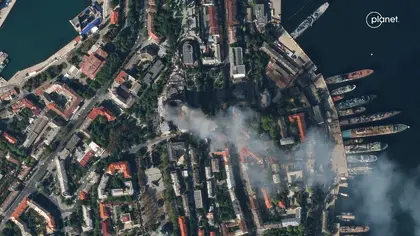Ukraine is making steady progress in its fight to retake Crimea a decade after Russia’s “little green men” first invaded the peninsula in 2014 – and more major advances are expected later this year.

JOIN US ON TELEGRAM
Follow our coverage of the war on the @Kyivpost_official.
Although Russian troops spent years digging-in in Crimea, turning the popular vacation spot into a military hub, special operations by the Armed Forces of Ukraine (AFU) over the last two years have decimated the Kremlin’s logistical capability and military readiness, according to a new report published by The Atlantic Council on Thursday.
“With international attention firmly fixed on the Russian army’s advances in eastern Ukraine and the Ukrainian invasion of Russia’s Kursk region, it is easy to overlook important developments taking place further south in Crimea,” wrote Serhii Kuzan, the Chairman of Ukraine’s Security and Cooperation Center and a former adviser to the Ukrainian Ministry of Defense.
“During 2024, Ukraine has achieved a number of strategic successes in and around the Russian-occupied peninsula that are worthy of closer attention and could shape the ultimate outcome of the war,” he said.

Ukraine Dismantles Nearly 50 Smuggling Networks Aiding Draft Dodgers
The three main military initiatives by the AFU that have weakened Russia’s grip on Crimea include:
- The destruction of almost one-third of Russia’s Black Sea navy fleet using surface drones and missiles that have rendered the Russian navy virtually ineffective.

- The use of long-range missiles that have forced Russia to push its air defense systems back from northwestern Crimea, leaving a large part of the peninsula vulnerable to further counterattacks.
- The successful targeting of key logistics hubs and routes leading to the peninsula that have severely limited the ability of Moscow’s forces to supply the area with essential material resources.
The AFU has used this three-pronged approach to push all of Russia’s navy out of the Sea of Azov and limit the Kremlin’s ability to stage attacks from the south, according to Kuzan. Even more, the targeting of Crimea has offended Putin, who has constantly promoted the capture of the peninsula as a major victory.
“The 2014 occupation of the Ukrainian peninsula is routinely portrayed in Kremlin propaganda as the greatest achievement of Vladimir Putin’s entire reign and a symbol of Russia’s return to great power status,” Kuzan said. “Putin’s current inability to defend Crimea is therefore widely perceived as a personal humiliation.”
US allies support Ukraine’s efforts to repatriate Crimea, according to General Ben Hodges, a former NATO official and commanding general of US forces in Europe.

“We could be 100% clear to the Ukrainians and the Russians that we are 100% in favor of them retaking Crimea, however they do it,” Hodges told Al Jazeera last week.
And more movement towards once again raising a blue-and-yellow flag on the peninsula can be expected by the end of the year, he added.
Hodges concluded: “Crimea… is sovereign Ukraine, and there will be no US tapping of the brakes if they take down that Kerch Bridge – which I do predict is going to happen this year.”
You can also highlight the text and press Ctrl + Enter






